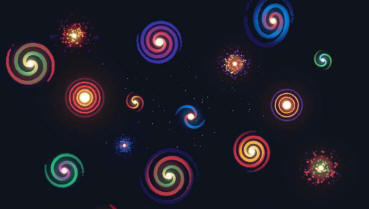|
|
|||
|
|
|||
Pakistan's premier website that covers current affairs and news.
News Science Discoveries 2019: Did dark energy cause the Big Bang?
As far as cosmologists can tell, the mysterious force behind the accelerated expansion of the universe, a force that we call dark energy, remains constant.

Let's start with the present: Something strange is happening to the cosmos. It's expanding, but it's also full of matter. The gravitational attraction of all that stuff ought to be slowing down that expansion of the universe as time goes on.
Water on Mars: New discoveries
Science Magazines for students
Best Science Magazines for High School Students
Share your views at editor.newsflash@gmail.com
But the early universe was a much stranger place, and much stranger things could have happened long ago. And if they did happen, they could have had massive consequences for the rest of cosmic history.
And then there was light
While we barely understand the nature or cause of dark energy, we do know that it can't do much more than accelerate the expansion of the universe. That's because, nowadays, the universe is — cosmologically speaking — old, cold and mostly dead.
This big-picture retirement means that there isn't a lot of energy (dark or otherwise)to go around. If dark energy did something funky now, like change over time, it wouldn't have a big effect, because dark energy is already incredibly feeble. Yes, it’s accelerating the expansion of the universe, but only mildly, which is why it took us so long to identify its effects in the first place. This weakness limits both what dark energy can do today and what we can learn about it; there just aren't a lot of effects for cosmologists to measure. But the early universe was much hotter, denser, more compact and, most especially, more energetic.
And while dark energy emerged onto the cosmic scene about 5 billion years ago, that wasn't necessarily its first appearance. Dark energy could have been alive and kicking in the young cosmos, doing all sorts of interesting things before temporarily subsiding into the background. Recently, a team of theoretical physicists pondered what such early dark energy could have done, reporting their results in November 2019 in a paper they uploaded to the preprint server arXiv.org.
The researchers found that a brief fluctuation in dark energy could have flooded the early universe with exotic particles like quarks, gluons and leptons that would eventually congeal into the atoms we know and love today.
A better universe
According to those researchers, this flood must have happened after inflation, when the very early universe grew incredibly large in a very short amount of time. After this inflation, the universe was altogether empty; all of the preinflation ooze was simply blown away like dust in the wind. Something had to come after that to "reheat" the cosmos, bringing in a fresh round of particles to the universe in what we commonly think of as "the Big Bang."
Most theorists think that whatever caused inflation itself must have also generated the reheating, but this new work suggests that early dark energy could have created the flood of particles by losing its own energy. It's an interesting story, but the scientists' hypothesis still has to fit with the observations that cemented our understanding of the Big Bang and inflation in the first place. If dark energy is responsible for the universe's reheating, then we should see subtle changes to the standard picture’s model
of the cosmic microwave background, which in turn influences the pattern of galaxies in the modern universe.
So far, the new model of reheating matches all current observations, a bit better, even, than traditional theories of inflation do. But we don't really have enough information to tell whether that's just a statistical fluke.
New generations of astrophysics tools, like NASA's Wide Field Infrared Survey Telescope (WFIRST), might help scientists better understand dark energy and its role in the young universe and today's cosmos.
Posted on March 6, 2020
Australia's raging fires will create big problems for fresh drinking water
Malala is on Teen Vogue's 'Cover of The Decade'
Women in space: Christina Koch completes 300 days in space
Send your contributions at editor@newsflash.com.pk

